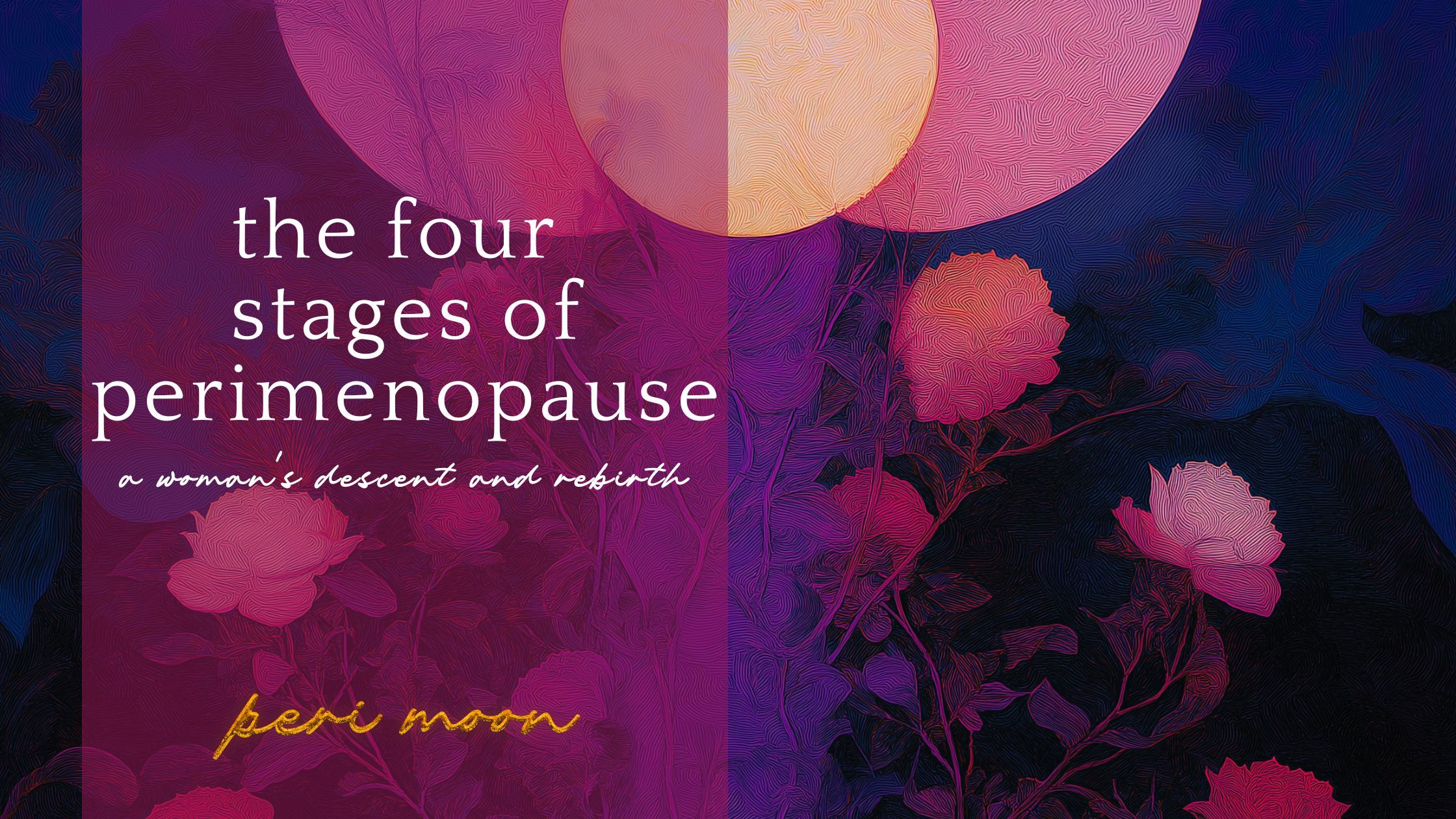The Four Stages of Perimenopause: A Woman’s Descent and Rebirth
Feb 13, 2025
It does not happen all at once.
Perimenopause is not a sudden switch, nor is it a single, linear decline. It is a process- layered, unpredictable, and deeply transformative. Lara Briden describes it as a transition with distinct phases, each one shifting the hormonal landscape in its own way. Like the tides, perimenopause ebbs and flows before it fully ushers in the next era of your life.
The journey lasts, on average, five to ten years, beginning in your late 30s or early 40s and culminating with menopause- the moment when twelve full months have passed since your last bleed.
But menopause is not the moment to watch for. The real changes begin long before that final cycle.
Stage One: The Silent Undercurrent (Late 30s to Early 40s, Lasting 2-5 Years)
It starts so subtly, you might miss it.
This is the phase where progesterone begins its slow, steady decline, while oestrogen remains high and often erratic. The shifts are small at first:
- Your cycles may still be regular, but perhaps they feel different; heavier, lighter, or punctuated with mid-cycle spotting.
- Sleep is suddenly more fragile, fractured, elusive.
- PMS may become more intense, you may question your mental health.
This is not ageing. This is adaptation.
Your brain is already recalibrating, your nervous system adjusting to a world with less of progesterone’s soothing embrace. If you’ve ever felt a sudden impatience with things you once tolerated, if you’ve noticed a restless hunger for something more… this is why.
Your body is whispering. Listen now, before it starts to roar.
Stage Two: The Storm Before the Shift (Early to Mid-40s, Lasting 2-3 Years)
This is when you know, deep in your bones, that something is changing.
The key marker of this phase is the shortening of your cycle. If you once bled every 28 days, now it may be 24. Or 21. Or wildly inconsistent. This happens because ovulation is becoming sporadic - when you don’t ovulate, progesterone does not rise to balance oestrogen, leaving you in a state of excess.
Excess estrogen is not gentle.
- Your periods may become heavier, as if your body is clearing house with renewed urgency.
- Breast tenderness, headaches, and bloating may increase.
- Anxiety creeps in, seemingly out of nowhere. The heart races. Sleep shatters.
- And the rage - oh, the rage. The kind you cannot swallow down anymore. The kind that demands to be heard.
This is not a flaw. This is your nervous system learning to function with a new hormonal rhythm. Your body is not betraying you, it is calling you inward, asking you to create space for deep, unshakeable self-care.
You can fight this, or you can surrender. Either way, the storm is coming.
Stage Three: The Great Undoing (Mid to Late 40s, Lasting 1-3 Years)
By now, cycles are skipping. Months pass without a period, and when it does arrive, it feels foreign - either impossibly light or like a flood that leaves you depleted. The oestrogen spikes have waned, and now it is plummeting, dropping lower than ever before.
This is the moment when symptoms take on their most intense form.
- Hot flushes flare up, the body burning away all that no longer serves.
- Sleep is no longer just fragile - it feels impossible.
- Brain fog settles in.
- Energy fluctuates wildly - some days, you feel invincible; others, you cannot lift yourself from the couch.
But something else is happening beneath the surface.
Your priorities are shifting. The need to please, to accommodate, to shape yourself to fit the expectations of others is slipping away.
This is not a breakdown. It is a reckoning.
And when you emerge, you will not be the same.
Stage Four: The Threshold of the Wise Woman (Late 40s to Early 50s, Lasting 1-2 Years Before Menopause)
The waves begin to settle.
Periods come months apart, then disappear altogether. Oestrogen is at its lowest, but so too is the chaos. Your body is adjusting to its new hormonal baseline, and symptoms, though still present, are no longer as sharp.
Here, a new clarity begins to surface.
The world may see this as the end of something, but you know better. You are stepping into something richer. Something deeper. The wise woman phase is not about loss. It is about the return of your full self, unburdened, unapologetic.
You are not who you were before. You are something more.
The Journey Is Not Linear
These stages are not neat, and they do not always arrive on time. You may move forward, then back again. You may find yourself caught in the tempest of stage two for longer than expected, or slipping into stage four before you feel ready.
But the destination is always the same:
A woman reborn in her own fire.
So when the changes come, as they will, do not fear them. Instead, stand in the doorway of this transition and say:
I am ready.
If you’re ready to sit with a luscious, heart-centred community and wisdom hub for women in perimenopause join us here.

